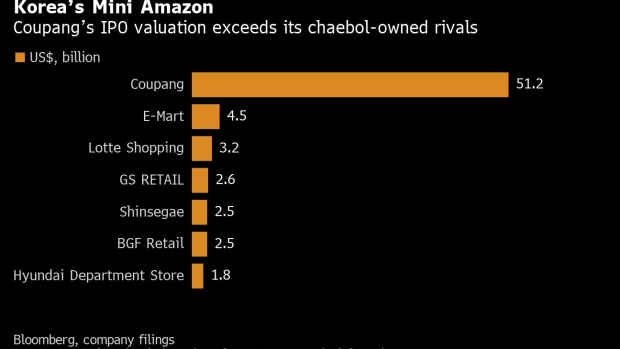Mar 6, 2021
Coupang’s $3.6 Billion IPO Shows U.S. Remains King for Tech IPOs
, Bloomberg News

(Bloomberg) -- South Korean e-commerce giant Coupang Inc.’s is on track to be the largest listing by a Korean company in a decade. And, like most of the major tech offerings these days, it’s happening in New York.
There are three big reasons that explain why the U.S. is a better pick for the e-tailer backed by SoftBank Group Corp.’s Masayoshi Son. Perhaps most significantly, New York offers a considerable valuation premium. It also has a deeper, more liquid market, and allows uneven voting rights that would benefit Coupang’s founder, Harvard Business School drop-out Bom Kim.
The U.S. has been the destination of choice for mega tech initial public offerings, with 2020’s biggest debuts Airbnb Inc. and DoorDash Inc. both listed in New York. Chinese e-commerce giants such as Alibaba Group Holding Ltd. and JD.com Inc. also went public there. Coupang is seeking to raise up to $3.6 billion in its IPO and could garner a value of more than $50 billion. That would make it the largest float by a Korean company since Samsung Group took its insurance unit public at home in 2010.
Had the loss-making e-commerce firm listed in Korea -- which from this month will allow unprofitable companies to go public -- Coupang could have fetched a maximum valuation of just $10 billion, according to Suh YongGu, a marketing professor at Sookmyung University.
“The history of capitalism in South Korea is short, so Koreans don’t ascribe high valuations to loss-making companies,” said Suh.
South Korea’s stock market is less than 70 years old, and is dominated by chaebols, or family-controlled industrial groups. Korean investors’ appetite for their homegrown entrepreneur-led startups, however, will be tested in coming months with IPOs by Krafton Inc., the creator of hit game PUBG, and the country’s biggest mobile-only bank Kakao Bank. Unlike Coupang, the two firms are profitable.
Coupang has lost money in the last three years, recording an accumulated deficit of $4.12 billion as of December, according to its filing. Thanks to the surge in online shopping during the pandemic, however, it managed to nearly double its revenue to $12 billion last year.
A $51 billion valuation would put Coupang among the five most valuable companies in Korea, of which Samsung Electronics Co. is the biggest. Korea’s other big startups with growing clout in e-commerce -- the $58 billion Internet conglomerate Naver Corp., and the $39 billion messaging app Kakao Corp. -- are both listed in Seoul, but were both profitable when they went public. The two are backed by entrepreneurs and not linked to the chaebols like Samsung Group.
In fact, Coupang’s listing in the U.S. will allow it to exceed the combined market value of the six chaebol-owned retailers trying to expand their presence in e-commerce -- E-Mart Inc., Lotte Shopping Co., GS Retail Co., Shinsegae Inc., BGF Retail Co., and Hyundai Department Store Co..
Liquidity is another allure of the U.S. market, allowing companies to raise funds frequently through secondary share sales. Korea’s stock market, at a total value of $2.12 trillion, is a fraction of the $44.2 trillion of the U.S., according to Bloomberg data.
“It’s easier for investors to exit” their stakes in the U.S., said Seo Sang-Young, an analyst at Kiwoom Securities in Seoul. “And the trading volume is much larger.”
And finally, a U.S. listing gives founders more power.
Korea doesn’t allow uneven voting rights, favored by tech firms like Alphabet Inc. and Facebook Inc., who see it as a way for founders to focus on the long-term. But the U.S. does, even if the ownership structure is itself not without controversy, as it lacks shareholder protections. Kim, Coupang’s 42-year-old founder, will end up with 76.7% of the company’s voting rights with just 10.2% of its outstanding shares.
“We would have liked Coupang to list in Korea,” said Kim Sung-gon, a spokesperson at Korea Stock Exchange. “But we respect the company’s choice.”
Korea IPO Boom Year Kicks Off With Coupang Float
Still, missing out on the chance to buy into one of the country’s hottest companies in the biggest Asian company IPO since Alibaba Group Holding Ltd.’s $25 billion New York listing in 2014 is rankling the retail investors who have come to dominate Korea’s stock market since the pandemic spread.
“There is certainly regret among retail investors that they cannot buy into the IPO,” said Kim DongJoo, the CEO of Iruda Discretionary Investment, a Seoul-based investment firm catering to retail investors seeking to buy foreign stocks.
Largest IPOs by Korean Companies:
Coupang prides itself on its same-day or at least pre-dawn deliveries. It is also giving its warehouse staff and 15,000 full-time delivery workers a total of $90 million in pre-IPO stock, a unique largess that comes at a time when the deaths of a string of couriers from overwork as online orders soared is causing a national uproar.
“We believe we are the first company in Korea to make our front-line employees stockholders,” Kim said in a letter to shareholders in Coupang’s IPO filing.
©2021 Bloomberg L.P.





